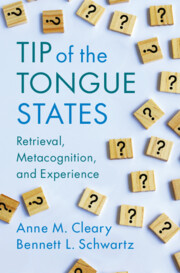Book contents
- Tip of the Tongue States
- Tip of the Tongue States
- Copyright page
- Contents
- Figures and Table
- Preface
- Chapter 1 Introduction and History of Research on Tip-of-the-Tongue States
- Chapter 2 Methodology
- Chapter 3 Tip-of-the-Tongue States in the Lab and in the World
- Chapter 4 Tip-of-the-Tongue State Etiology
- Chapter 5 Phenomenology
- Chapter 6 Flipping the Script
- Chapter 7 It’s Not All Bad
- Chapter 8 Tip-of-the-Tongue States Early and Late in Life
- Chapter 9 Toward an Understanding of the Neural Basis of the Tip-of-the-Tongue Experience
- Chapter 10 Related Phenomena
- Chapter 11 Tying It All Together
- References
- Author Index
- Subject Index
Chapter 6 - Flipping the Script
Tip-of-the-Tongue-State-Related Biases
Published online by Cambridge University Press: 26 May 2025
- Tip of the Tongue States
- Tip of the Tongue States
- Copyright page
- Contents
- Figures and Table
- Preface
- Chapter 1 Introduction and History of Research on Tip-of-the-Tongue States
- Chapter 2 Methodology
- Chapter 3 Tip-of-the-Tongue States in the Lab and in the World
- Chapter 4 Tip-of-the-Tongue State Etiology
- Chapter 5 Phenomenology
- Chapter 6 Flipping the Script
- Chapter 7 It’s Not All Bad
- Chapter 8 Tip-of-the-Tongue States Early and Late in Life
- Chapter 9 Toward an Understanding of the Neural Basis of the Tip-of-the-Tongue Experience
- Chapter 10 Related Phenomena
- Chapter 11 Tying It All Together
- References
- Author Index
- Subject Index
Summary
Many TOT-related biases have been discovered since the initial inadvertent finding of a TOT-related bias toward inferring the likely study status of an unidentified target word by Cleary (2006). These biases range from inferring fluent characteristics of the unidentified target to inferring fluent partial attributes of the unidentified target to inferring positive emotional qualities of the unidentified target. These TOT-related biases also include a tendency toward exhibiting information-seeking behaviors such as using limited experimental resources to discover the unidentified answer or even deciding to take an unrelated gamble. They also include a tendency toward experiencing illusory partial recollection. Though the exact cause of these TOT-related biases remains a current gap in understanding, they collectively point toward the idea that TOT states do not occur in metacognitive isolation but rather are accompanied by a number of other distinct metacognitive subjective phenomena as well as by biased judgments and decisions about courses of action. Understanding these biases has many implications for understanding the etiology of TOTs and their relation to retrieval.
Information
- Type
- Chapter
- Information
- Tip of the Tongue StatesRetrieval, Metacognition, and Experience, pp. 110 - 129Publisher: Cambridge University PressPrint publication year: 2025
